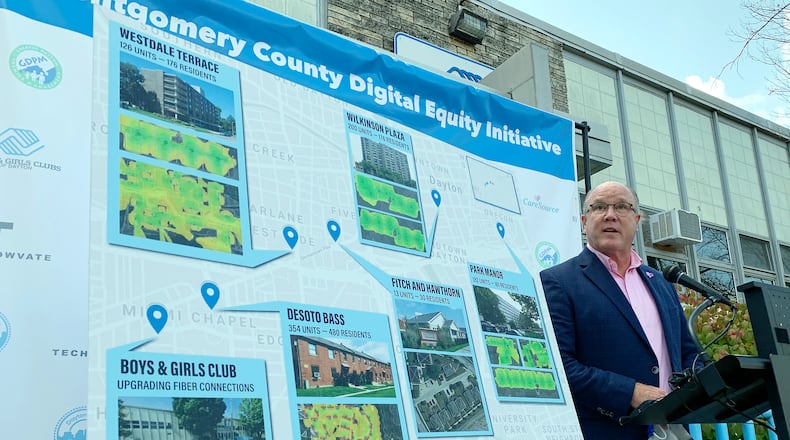“For people living in poverty, everyday challenges have become tougher during this pandemic. And in many cases, lack of access to technology is one of the biggest barriers,” said Dan McCabe, CareSource’s chief administrative officer and CEO of the CareSource Foundation.
The public housing Wi-Fi systems will be installed at Desoto Bass Courts, Fitch and Hawthorn, Park Manor, Westdale Terrace and Wilkinson Plaza, all owned by Greater Dayton Premier Management, the county’s public housing authority.
“It will allow residents to break down some of those barriers that for too long prevented them from what everybody wants and deserves: the opportunity to reach their full potential,” said Jennifer Heapy, CEO of Greater Dayton Premier Management.
Hardware and cable is already being installed by Cincinnati Bell, which put together a proposal of a little more than $2.8 million that includes system installation and service charges for three years.
The CareSource seed money will help pay the monthly fees, said Amy Riegel, director of housing for CareSource.
“This is going to help cover that service charge on a monthly basis for all the units that are receiving service and for maintenance and upkeep on that system, hopefully, for at least two-and-a-half years, maybe stretching into three,” she said.
Riegel said CareSource and other community partners are working to raise funds to fill the gaps. The goal over time is to keep the collaboration going to sustain the project beyond the first few years.
“Three years after the installation, then whether it’s recapitalizing the fund, or other sources that could come in to help cover that,” she said “We can evolve with the project as time changes and as things mature.”
Local stakeholders working on sustainable funding for the Digital Equity Initiative include: the city of Dayton, Greater Dayton Regional Transit Authority, Dayton Public Schools, Dayton Development Coalition, Dayton Area Chamber of Commerce, DP&L, CityWide Development Corp., Techknowvate, Montgomery County Educational Service Center, Dayton Children’s Hospital, Five Rivers Health Centers and Technology First.
The public will eventually be able to donate to the effort through a fund being set up at the Dayton Foundation, Riegel said.
Stakeholders kicked off the initiative Thursday at the Boys & Girls Club of Dayton, which will get a fiber upgrade and other new technology through the project just as it embarks on a $5 million fundraising effort to renovate the Stewart Street facility, said Tara Marlow, CEO of the Boys & Girls Club of Dayton.
“It is going to move us in the right direction for our youth and ensure that we build a state-of-the-art 21st century Boys and Girls Club right here in West Dayton,” she said.
Cincinnati Bell, Professional Cabling Solutions and Tyco Cloud Services are contributing a firewall, Wi-Fi access points, monthly service, access control and state-of-the-art security cameras for the Boys & Girls Club.
“Digital equity ultimately comes down to providing universal access and opportunity through connectivity, regardless of one’s socioeconomic status,” said Tom Simpson, chief operating officer of Cincinnati Bell. “Education, jobs, and healthcare are the great equalizers in our society.”
About the Author

